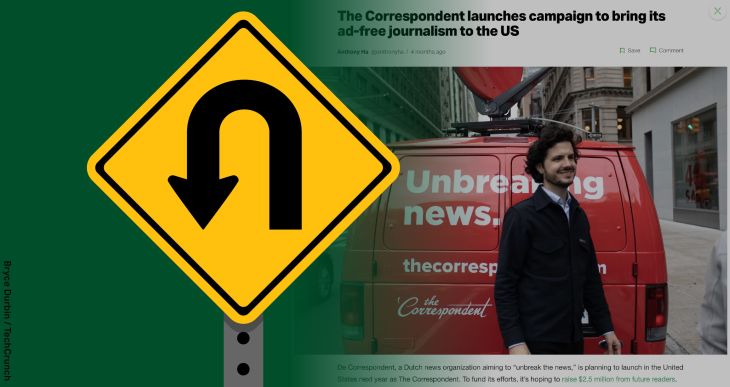Dutch news organization The Correspondent surprised some of its supporters earlier this week when co-founder and CEO Ernst Pfauth posted an update on Medium saying that the company would not be opening a newsroom in New York City.
Which was odd, because the organization raised $2.6 million in a crowdfunding campaign last fall with the express purpose of launching in the United States.
At least, that’s what I thought. After all, I wrote an article titled, “The Correspondent launches campaign to bring its ad-free journalism to the US.”
But here’s how Pfauth explained the decision in his post (emphasis in the original):
We’ve closed our campaign office in NYC, and we have decided that we won’t open a newsroom in the US for now. We don’t aim to be a national US news organization (we have founding members from more than 130 countries around the world!) but instead want to cover the greatest challenges of our time from a global perspective — in English. For that vision, Amsterdam is as a great place to start.
So was this the plan all along? In an interview with NiemanLab, Editor-in-Chief Rob Wijnberg argued that this is consistent with what The Correspondent team promised in the campaign: “We’re setting up in English language, and we’re going to hire U.S.-based journalists as well.”
He went on to say that the team “never really talked about setting up an office” in the United States. Still, he acknowledged that it was a U.S.-centric campaign, with Wijnberg and Pfauth spending most of their time in New York, reaching out to U.S. journalists to write about the campaign and recruiting other journalists and pundits to serve as “ambassadors.”
“So it got interpreted by a lot of media who wrote about us as, ‘They’re launching in the U.S.,’ ” Wijnberg said. “Which is pretty much 80 percent true, in the sense that we are going to have English-language correspondents in the U.S. — just not only in the U.S. And we never promised — or never said, because that’s not our model — to have, to cover the United States or anything.”
So I thought: Okay, that makes sense. I must have misunderstood what Pfauth was telling me.
Still, I wanted to figure out how I got this wrong, so I went back to the initial email I received from Pfauth. Here’s how it began: “Dear Anthony, I’m CEO and cofounder of The Correspondent, an online journalism platform from Amsterdam that will soon be launching in the U.S.”
Then he gave a quick description of The Correspondent’s ad-free, reader-funded model, adding, “We aim to bring the same journalistic integrity and unconventional editorial approach when we launch in the U.S.”
It’s so weird that I ended up thinking they were planning to launch in the U.S.!
Wijnberg acknowledged the confusion in his interview, telling NiemanLab, “Tons of people talk about what we’re trying to do. So the idea that you can keep all these people on message all the time would be kind of totalitarian, right?”
Maybe … except this isn’t an overly enthusiastic ambassador; it’s the company’s CEO. (And it seems he made a similar pitch to other publications.) One might argue that keeping him on message — a.k.a., making sure he accurately describes the company’s plans as he asks people for money — is not only not “totalitarian,” but actually the responsible thing to do.
The truth is, I don’t know what happened here. If The Correspondent never planned to open a U.S. office, thinks it can do a good job covering the U.S. without one and simply did a bad job communicating? Fine. If the original plan was to open a U.S. office, then it reconsidered? That would be disappointing, but if the model still produces worthwhile journalism about the U.S., then I suppose it’s a net positive.
But these confusing, convoluted, “I’m sorry that you didn’t understand us” explanations don’t just make the company look disingenuous — they also seem antithetical to running a newsroom that depends on readers’ knowledge, goodwill and money.
Update: Jay Rosen, who is advising The Correspondent, has written a post in which he acknowledged that the company “screwed up its communications with members.”
Apparently, the original plan was to have its English-language headquarters in New York, but the thinking evolved as the team considered issues like cost and the benefits of having a distributed newsroom, eventually settling on the idea of “a one newsroom strategy … with headquarters in Amsterdam and the new correspondents working remotely.”
“I was initially taken back,” Rosen wrote. “I would not have come up with that idea. But the more I thought about it, the more sense it made, especially when it came to the talent search, and to the aspiration to one day be a global brand.”
Fair enough! It’s just a little mystifying that Wijnberg and Pfaust didn’t say that in the first place.
